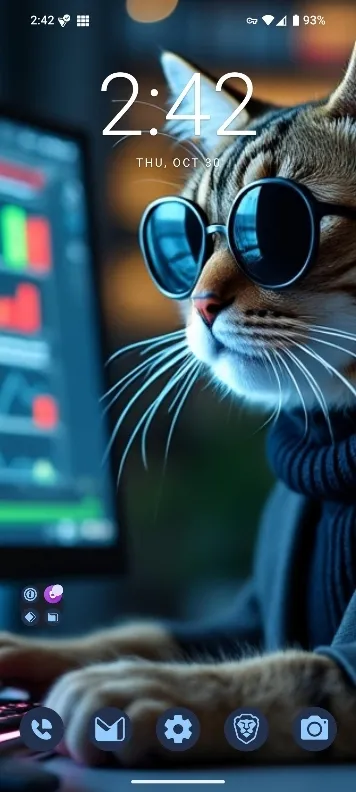Sun, Sand, and Security: Our GrapheneOS Experience in the West Indies

We've just returned from a fantastic trip to the West Indies. As always, the questions about our tech setup poured in. Our long experience in security and privacy always drives our advice, and this vacation was the perfect chance to put those principles to the ultimate test.
The two questions we hear most often are:
- Do you actually use the privacy tools you write about? Absolutely. We use them every day, and especially while traveling. We would never recommend a setup we haven't thoroughly vetted ourselves.
- What exactly is on your phone, and how well does it work for a real vacation? This is the best question. We're ready to answer it in detail by walking you through our complete Travel Phone setup.
Why a Travel Phone?
Travel is tough on technology. When you’re constantly moving, your environment is unfamiliar, and you're far more likely to be distracted. Whether you're in a crowded taxi or relaxing on a beach chair, your phone is at a higher risk of being dropped, lost, or stolen. Surveys show U.S. travelers report losing or damaging anywhere from 10% to 35% of their gadgets while on the road. When your latest smartphone costs more than your first car, that's a risk we're not willing to take.
More importantly, the real risk isn't just the physical device—it's the sensitive data stored on it.
That’s why we rely on a Travel Phone: an older device, specifically configured for a trip. It’s set up with a minimal number of essential apps and runs on a limited-life SIM card with a fixed amount of data. If the worst happens, the loss is purely financial, and our most sensitive data remains safe at home.

The Phone: Google Pixel 8a
For this trip, we chose a lightly used, OEM unlocked Google Pixel 8a (128GB). The Pixel 8a's hardware security system is excellent for protecting user data. It features the Titan M2 security chip, which works with the Tensor G3 processor and a Trusted Execution Environment (Trusty) for end-to-end security.
This hardware configuration is perfect for installing GrapheneOS, which adds a crucial layer of security and privacy. A key reason for choosing GrapheneOS for travel is the auto-reboot feature: after a set time of inactivity, the device automatically reboots. This ensures that if the device is lost, it instantly reverts to its highest level of protection, as the decryption key must be entered manually before the device can be used.
Core GrapheneOS Apps: Security by Default
GrapheneOS is designed to be minimal and secure. It replaces many standard Google apps with hardened, privacy-focused alternatives. Here is a breakdown of the default apps we relied on:
| App Name | Primary Function on GrapheneOS | Why It Matters for Travel |
|---|---|---|
| App Store | The official GrapheneOS app repository for core system apps and updates. | Secure Updates: Ensures all GrapheneOS-developed apps are updated securely and instantly, without reliance on any third party. |
| Auditor | Hardware-based verification tool to attest to the integrity of the operating system. | Tamper Detection: Allows local or remote verification that the OS has not been modified or compromised since its last boot. This is a critical security check for a device used abroad. |
| Camera | A modern, privacy-focused camera app that does not require network access. | Metadata Control: Captures photos without automatically integrating with cloud services or adding excessive metadata, protecting where and when your photos were taken. |
| Info | A utility for viewing system-level information. | Troubleshooting: Helps quickly check system details like OS version and security patch level if any issues arise. |
| Messaging | A minimal, AOSP-based SMS/MMS application. | Basic Communication: Provides simple, local-only texting capabilities for necessary communications (e.g., two-factor authentication via SMS) without reliance on a web-connected messenger. |
| PDF Viewer | A security-focused, minimalist PDF viewer based on AOSP. | Reduced Attack Surface: Limits the potential for exploits that can be embedded in complex PDF files, keeping our travel documents safe. |
| Vanadium | The default web browser, a privacy and security-hardened fork of Chromium. | Hardened Browsing: Includes numerous security and privacy patches (like stronger anti-fingerprinting and better sandbox isolation) not present in standard Chrome, which is crucial when using unfamiliar Wi-Fi networks. |
| Markup | A simple utility for drawing and adding notes to screenshots and photos. | Quick Annotation: Essential for travel—quickly highlighting details on a map, a confirmation code, or a schedule without needing a complex, data-collecting third-party editor. |
| Google Play Store (Sandboxed) | (See note below) | |
| Google Play Services (Sandboxed) | (See note below) |
A Note on Sandboxed Google Play: GrapheneOS allows you to install Google Play Services and the Play Store as completely sandboxed, unprivileged apps. They run just like any other application. You can deny them permissions (like Network access) or simply put them to sleep when not needed. For the Travel Phone, we confined these services to a minimal user profile only for those few non-negotiable apps that truly required them (e.g., the eSIM management app).
The Setup: Finding the Right Travel Apps
After setting up GrapheneOS, the next challenge is finding and installing new apps. Our travel setup was simple, focusing on privacy-focused apps that do not rely on Google Play services.
Ideally, apps needed to run locally or use end-to-end encryption with zero-knowledge architecture, meaning the service provider could not view the data. Our first stop was the popular F-Droid app store.
F-Droid: FOSS & Privacy First
F-Droid is a privacy-focused alternative to mainstream app stores, offering a curated collection of free and open-source software (FOSS) apps free from ads and tracking.
| App Name | Primary Function on GrapheneOS | Why It Matters for Travel |
|---|---|---|
| Aurora Store | Anonymous, unofficial client for the Google Play Store. | Anon App Access: Allows downloading and updating apps from the Google Play Store without needing a Google account or the official, privacy-invasive Play Services. |
| Brave Browser | A privacy-focused web browser based on Chromium. | Ad & Tracker Blocking: Offers built-in ad and tracker blocking, improving browsing speed and reducing data exposure, which is vital on unfamiliar public Wi-Fi. |
| Ente Authenticator | Open-source, encrypted 2FA TOTP code generator. | Local & Encrypted 2FA: Generates two-factor authentication codes locally, securing access to accounts with a critical, self-managed layer of encryption. |
| Ente Photos | Zero-knowledge, end-to-end encrypted photo and video cloud backup. | Secure Media Backup: Encrypts travel photos on the device before they are sent to the cloud, ensuring no one, not even the service provider, can view them. |
| Molly FOSS | A security-hardened, fully FOSS fork of the Signal messenger. | Hardened E2E Messaging: Provides Signal's end-to-end encryption with added security features like passphrase-protected database and RAM shredding, perfect for highly sensitive conversations. |
| Notesnook | Zero-knowledge, end-to-end encrypted note-taking application. | Encrypted Travel Journal: Used for securely logging trip details, confirmation numbers, and a travel journal, all protected by a zero-knowledge architecture. |
| Organic Maps | Fast, privacy-focused, and 100% offline map and navigation app. | Offline Navigation: Essential for avoiding expensive data roaming charges and poor cell service; it works completely offline with no ads or tracking. |
| Proton Pass | Zero-knowledge, open-source password manager with integrated email alias feature. | Dynamic Email Alias Generation: Proton Pass is integrated with SimpleLogin to generate new, unique, and private emails on the fly, allowing you to turn them off when no longer needed. This is key when every booking asks for your email. |
| ProtonVPN | A free/paid Virtual Private Network service from a respected Swiss company. | Encrypted Connection: Encrypts all internet traffic, protecting the device from man-in-the-middle attacks when using public Wi-Fi at airports or cafes. |
| Yubico Authenticator | App for using a physical YubiKey hardware security key. | Ultimate Account Security: Requires a physical security key to generate codes, offering the strongest possible hardware-based 2FA for banking and primary email. |
Aurora Store: Filling the Gaps
Sometimes a fully FOSS option isn't available. Companies like Proton sometimes place apps only on the Google Play Store to reach a larger audience. The Aurora Store fills this gap by allowing us to anonymously download commercial apps from Google Play. Combined with GrapheneOS's sandboxed Play Services, this allows us to use popular apps with minimal data leakage.
| App Name | Primary Function on GrapheneOS | Why It Matters for Travel |
|---|---|---|
| 1Password | A commercial, zero-knowledge password manager for cross-device compatibility. | Travel Mode Security: Selected for its robust Travel Mode feature, which is designed to protect sensitive data by hiding it when devices might be subject to search (e.g., border control), making it invisible unless Travel Mode is disabled. |
| Pixel Camera | Google's official camera application with advanced processing algorithms. | Superior Image Quality: Leverages the advanced image processing and computational photography features of the Pixel 8a's hardware, providing significantly better photo quality for travel memories than the default GrapheneOS camera. |
| FUTO Keyboard | A modern, open-source keyboard focused on being completely offline. | Local-Only Input: Ensures all text input, swipe data, and voice dictation are processed locally on the device, eliminating the risk of keylogging or data harvesting. It offers a much better experience than the default AOSP keyboard. |
| Mint Mobile | The official carrier application for managing the limited-life SIM card. | eSIM Account Management: Used to monitor data usage, manage top-ups, and handle eSIM provisioning for the local network access. Mint's inexpensive prepaid plans and "Minternational Pass" provided a fixed, cost-effective data solution that worked everywhere we visited. |
| Proton Calendar | Zero-knowledge, end-to-end encrypted calendar application. | Secure Scheduling: Encrypts event names, times, locations, and participants, ensuring your travel itinerary is private and cannot be viewed by the service provider or other third parties. |
| Proton Drive | Zero-knowledge, end-to-end encrypted cloud storage service. | Encrypted Document Vault: Used to securely back up copies of critical travel documents (passport, visas, insurance) and other non-photo media using zero-knowledge encryption, accessible only to you. |
| Proton Mail | Zero-knowledge, end-to-end encrypted email client. | Secure Communication: Provides the primary, end-to-end encrypted communication channel for booking confirmations and essential travel correspondence, backed by Swiss privacy law protection. |
| Google Voice | A U.S.-based VoIP number service for calling and texting. | Secure VoIP: This was a necessary pick. We needed a highly reliable US-based phone number for SMS confirmations that could be secured using a hardware token like a YubiKey, and Google Voice has proven the most solid service for this specific use case. |
Direct Installed
One app was a direct installation: Bitchat. We installed this as a backup in case we were not able to use cellular data for E2EE chat. In the end, we never really needed it.
The Most Valuable Apps (MVPs)
While every app was essential for the overall secure setup, a few proved to be the workhorses of the trip.
The top spot goes to the combination of the Pixel Camera with Ente Photos. We took fantastic shots with the camera's computational features, and Ente seamlessly encrypted them and backed them up to the cloud. The advanced camera settings ensured our memories were recorded in high quality.

The second MVP is Molly FOSS. It not only provided end-to-end encrypted communications via Signal but also kept us in touch with friends, family, and our favorite online groups.
Third place goes to Brave Browser with Proton VPN. Our various internet connections were kept secure by Proton VPN, and Brave allowed us to use the web for just about every other interaction we had online with minimal tracking.
Conclusion: Privacy in Practice
This post doesn't just list the privacy tools we use; it illustrates how they fit into a specific, real-world use case—the secure travel phone. We hope this breakdown of our GrapheneOS setup, from the security benefits of the Titan M2 chip to the application of zero-knowledge encryption for communication and data, encourages you to think critically about your own travel setup. We demonstrated that you can have both strong digital privacy and a fully functional, enjoyable vacation experience. Remember: we are not sponsored; all the funds for this phone setup, the services used, and the trip itself came directly from us. This setup worked exceptionally well, and while we'll always find small ways to improve our travel approach, the core principles of security and isolation remain invaluable.
Remember: We may not have anything to hide, but everything to protect.
